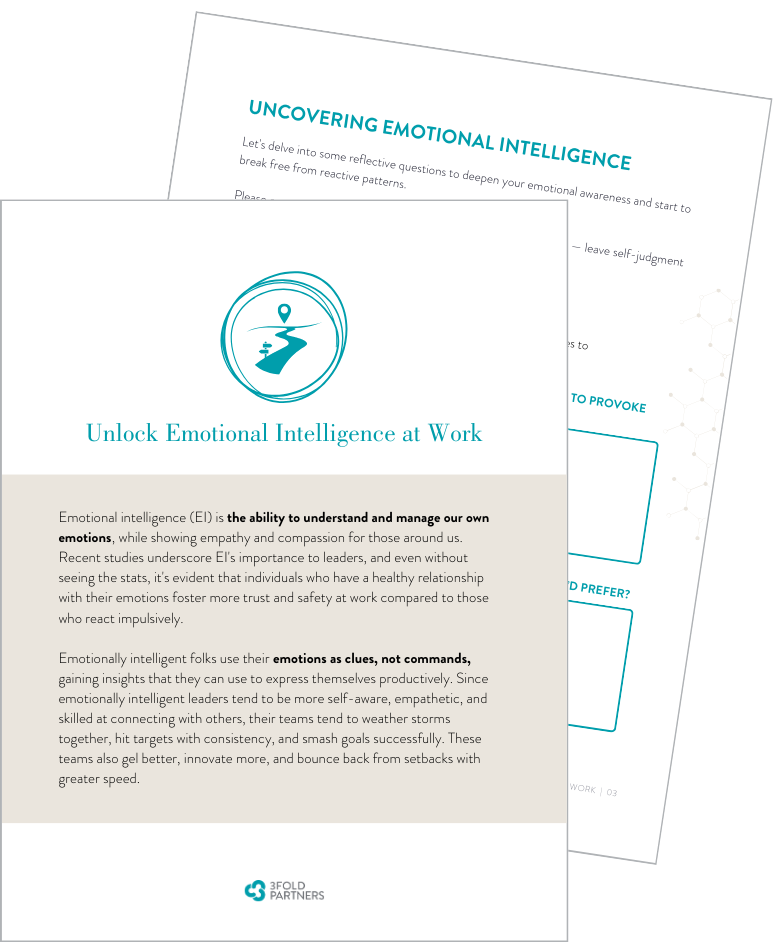Unlocking Emotional Intelligence in the Workplace
In the not-so-distant past, the workplace was primarily a domain where technical skills and IQ were held in the highest regard. But then along came emotional intelligence (EI), shaking up the old-school notions of what it means to be smart. Emotional Intelligence was coined in the '90s by psychologists Peter Salovey and John Mayer (no, not THAT John Mayer), and later championed by Daniel Goleman. The introduction of EI into the zeitgeist led to the realization that understanding and managing emotions is just as crucial for success as acing a test — maybe more so.
Emotional intelligence is the ability to understand and manage our own emotions while showing empathy and compassion for those around us. Studies over the past several years have underscored EI's importance to leaders and it's evident that individuals who have a healthy relationship with their emotions foster more trust and safety at work compared to those who react impulsively.
Emotionally intelligent folks use their emotions as clues, not commands, gaining insights that they can use to express themselves productively. Since emotionally intelligent leaders tend to be more self-aware, empathetic, and skilled at connecting with others, their teams tend to weather storms together, hit targets with consistency, and smash goals successfully. These teams also gel better, innovate more, and bounce back from setbacks with greater speed.
EI in Action — What It Is (And Isn’t)
Being emotionally intelligent at work does not mean putting on a happy face or suppressing negative emotions. By recognizing that our emotions provide valuable information about our responses to situations, we can consciously choose how we wish to proceed instead of letting them dictate our actions.
Common Misconceptions About EI in the Workplace (Busted!)
❌ Emotional intelligence equals being nice.
✅ While empathy and understanding are components of emotional intelligence, it's not solely focused on being agreeable or nice. EI is about knowing and handling emotions well, even in tough situations or when giving feedback.
❌ Emotional intelligence is fixed and innate.
✅ Emotional intelligence is not a fixed trait that individuals are either born with or without. It can be developed and enhanced over time through self-awareness, practice, and learning effective strategies for managing emotions.
❌ Emotional intelligence is only relevant for certain roles.
✅ EI is often associated with leadership or customer-facing roles, but it's valuable across all positions in all industries. Regardless of your role, it contributes to improved teamwork, communication, and problem-solving skills.
❌ Emotional intelligence is about suppressing emotions.
✅ Some may mistakenly think that emotional intelligence means suppressing or hiding emotions. The ability to recognize, understand, and appropriately express emotions in a constructive manner rather than letting them control behaviour is a powerful differentiator among individuals, particularly in professional settings.
❌ High emotional intelligence means always being positive.
✅ EI is not about being happy all the time. It's about leveraging both positive and negative emotions skillfully.
❌ Emotional intelligence is not important for success.
✅ Research has shown that individuals with high EI are more solid leaders, top communicators, and have stronger interpersonal relationships, all of which contribute to success in various aspects of work and life.
EI and Your Team
Effective team dynamics are often fueled by emotional intelligence, which plays a pivotal role in nurturing trust, encouraging collaboration, and driving productivity. Conversely, teams lacking in EI may encounter sometimes impermeable communication breakdowns and conflicts, hindering their overall performance.
Characteristics of Emotionally Intelligent Teams
Actively listen and show empathy
Provide constructive feedback with respect
Collaborate effectively
Handle conflicts calmly
Adapt well to challenge and change
Celebrate successes and support growth
Create an inclusive and supportive work environment
Communicate openly and transparently
Characteristics of Not-So-Emotionally Intelligent Teams
Interrupt or dismiss colleagues' opinions
Criticize openly
Engage in blame games
Resort to arguments
Cling to familiar routines and resist change
Fail to acknowledge achievements
Exhibit cliques or favouritism
Keep important information or concerns to themselves
At 3fold, we focus on enhancing EI by starting with empathy, compassion, and care for oneself before expanding these to others. We employ the EQi 2.0® and EQi 360® assessments to build awareness of EI. These quick-reference self-assessment tools feature clear competencies and well-organized detail that facilitates efficient and targeted development.
We have carried out EQ assessments with leaders at all levels in a wide variety of industries. Recently, one of our clients told us that, for him, simply applying some intentional focus on developing his EI made all the difference.
The EQ-i assessment, debrief, and one-on-one coaching made me more self-aware, and supported me in being more empathetic with myself. I am even more engaged with the team and more aware of how each person deals with everything — from conflict to customer relations, I am now more understanding of how everyone operates.
Find out how you can integrate emotional intelligence development with your team.
Bring awareness to your opportunity to expand emotional intelligence at work by downloading our EI Exploration Guide.




